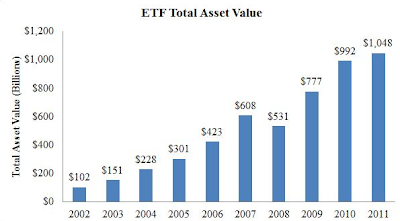
Our experts frequently write blog posts about the findings of the research we are conducting.
ETFs' Asset Value is Increasing, Trading Volume Remains Stable

Reserve your Clever ETF Ticker Before it's Too Late
But finding a catchy symbol can be tough these days. Many have already been taken: 1,350 symbols are in use on the NYSE Arca alone, the biggest U.S. market for exchange-traded products. That's up 108% over the past five years, says Ms. Morrison. In addition, fund firms have reserved 2,446 symbols for future...
Freddie Mac, complex derivatives, and one huge conflict of interest
President and CIO of Direxion admits that leveraged ETFs are not appropriate for most investors
The leveraged indexed ETFs are used by very tactical investors, and so there we have bull and bear funds. They have daily betas, which means that essentially...
FINRA Regulatory Notice: Complex Products
Futures-Based (Commodities) ETFs
Leveraged ETFs
Inverse ETFs
Introduction to ETFs
What are 'structured products', anyway?